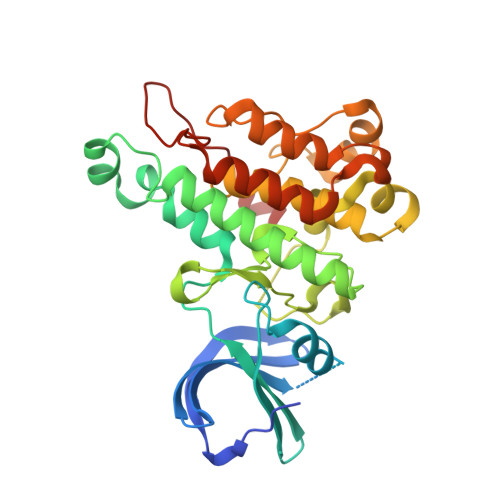The Selective Tie2 Inhibitor Rebastinib Blocks Recruitment and Function of Tie2
Harney, A.S., Karagiannis, G.S., Pignatelli, J., Smith, B.D., Kadioglu, E., Wise, S.C., Hood, M.M., Kaufman, M.D., Leary, C.B., Lu, W.P., Al-Ani, G., Chen, X., Entenberg, D., Oktay, M.H., Wang, Y., Chun, L., De Palma, M., Jones, J.G., Flynn, D.L., Condeelis, J.S.(2017) Mol Cancer Ther 16: 2486-2501
- PubMed: 28838996
- DOI: https://doi.org/10.1158/1535-7163.MCT-17-0241
- Primary Citation of Related Structures:
6MWE - PubMed Abstract:
Tumor-infiltrating myeloid cells promote tumor progression by mediating angiogenesis, tumor cell intravasation, and metastasis, which can offset the effects of chemotherapy, radiation, and antiangiogenic therapy. Here, we show that the kinase switch control inhibitor rebastinib inhibits Tie2, a tyrosine kinase receptor expressed on endothelial cells and protumoral Tie2-expressing macrophages in mouse models of metastatic cancer. Rebastinib reduces tumor growth and metastasis in an orthotopic mouse model of metastatic mammary carcinoma through reduction of Tie2 + myeloid cell infiltration, antiangiogenic effects, and blockade of tumor cell intravasation mediated by perivascular Tie2 Hi /Vegf-A Hi macrophages in the tumor microenvironment of metastasis (TMEM). The antitumor effects of rebastinib enhance the efficacy of microtubule inhibiting chemotherapeutic agents, either eribulin or paclitaxel, by reducing tumor volume, metastasis, and improving overall survival. Rebastinib inhibition of angiopoietin/Tie2 signaling impairs multiple pathways in tumor progression mediated by protumoral Tie2 + macrophages, including TMEM-dependent dissemination and angiopoietin/Tie2-dependent angiogenesis. Rebastinib is a promising therapy for achieving Tie2 inhibition in cancer patients. Mol Cancer Ther; 16(11); 2486-501. ©2017 AACR .
Organizational Affiliation:
Department of Anatomy & Structural Biology, Albert Einstein College of Medicine, New York, New York.
















